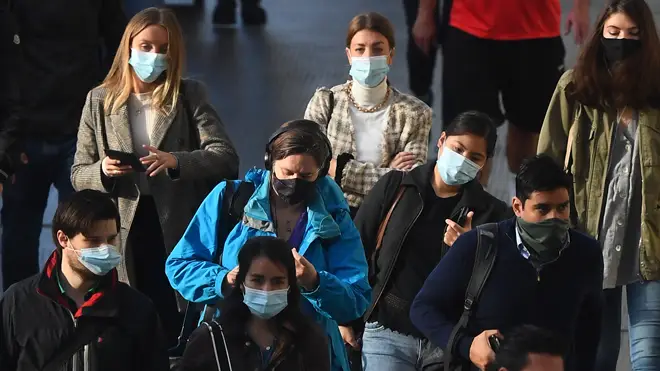
Simon Marks 4pm - 7pm
5 October 2020, 07:19

Far-right 'exploiting coronavirus crisis to try to recruit people'
Far-right extremists have been accused of exploiting the coronavirus crisis to recruit people, it has been claimed.
A former far-right extremist told LBC he is aware of groups who are even encouraging people who have COVID-19 to go out into ethnic communities "to try and spread that disease".
Nigel Bromage from Birmingham spent almost two decades in various organisations but decided to leave and now helps others leave with his organisation Small Steps.

Mr Bromage said: "It just shows you how cruel and calculating the far-right can be".
He said that far-right organisations are also using conspiracy theories and disinformation about the coronavirus pandemic to recruit members.
From helping people involved in these organisations, he claims recruitment can start from something as simple as seeing a video or meme online.
Mr Bromage described how one university student started their involvement: "He watched one movie which was six and a half hours... he came off being a committed neo-Nazi, that just shows how someone can change so quickly through the power of videos and memes".
As the internet becomes a larger part of lives during the pandemic, counter terror police say the lockdown period has been used as an opportunity to radicalise people.
Figures obtained by LBC show reports of online far-right extremism to counter terror police have risen by 58% during lockdown.
111 reports were made between March and July of this year, up from 70 in the same period in 2019.
Superintendent Matthew Davison from Counter Terrorism Policing North East told LBC the lockdown has created a unique set of circumstances.
Supt Davison explained the increased amount of time young people have been spending online has made them more accessible to extremist groups.
"We've got evidence and information that a number of extremist groups of different ideologies are proactively targeting young people."
He claimed that they're not only to spreading disinformation or hate but pro-actively recruiting young people.
Superintendent Davison said although the highest chance of a terror attack comes from Islamist extremist groups such as Daesh or al-Qaeda, extreme right wing groups are more widespread.
He added that organisations with right-wing ideologies "have been much more pro-active during lockdown to try and reach young people".
Such groups are using disinformation as a tool to spread their message to potential followers, as well as suggestions such as the COVID-19 pandemic is the "beginning of the end" and people should go out and commit crime.
However, Superintendent Davison said referrals to the Prevent Programme have decreased by 38% during lockdown.
Prevent is part of the Government's anti-terror strategy, aimed at stopping people becoming terrorists. However, the decrease comes after many of the institutions that identify people at risk of becoming radicalised went behind closed doors during the lockdown, such as schools and community groups.
There's concern that this could have a long-term impact.
Superintendent Davison said in a time when young people are spending more time than ever online but referrals are decreasing, "it's the stuff that we don't know about" that is worrying.
As schools, colleges and universities open again, he's hoping more people will spot the signs of someone who is being radicalised and ask police for help.
Counter terror police want parents and adults to be aware of the signs to look out for if their child or relative is being targeted or becoming radicalised. Examples given include becoming more secretive, reserved or using scripted language that sounds like it belongs to someone else.
The website Lets Talk About It, Working Together to Prevent Terrorism has more guidance and information. https://www.ltai.info/